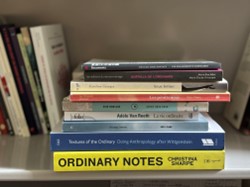
By
Dominique Hétu
October 2024
Print Version
What you need to know
This project studied how contemporary francophone literary texts revisit and imagine the concept of the ordinary beyond the default position that reduces it to the residual, routine, and repetition. It examined how these texts address the dilemmas, rituals, tensions, and responsibilities that stir and mark vulnerable ordinary life, and how they re/configure this idea of an “everyday” where the conditions for a good and habitable life operate.
Why this research is important
This research asks what it means to bring together literary studies and ordinary ethics as theoretical and critical tools for thinking through what could be called a “vulnerability turn,” especially as it appears in contemporary French cultural discourse and humanities. Concerned with texts of fiction and nonfiction that invest the ordinary not as a space but as a texture of everyday life, this project allows interrogating how these forms impact, if not trouble, our relation to the ordinary, to difference, and to the uncanny in everyday life.
How this research was conducted
Interested in how contemporary literary texts address these ordinary violences, this project mobilizes critical tools and approaches that allow working from the ground up, against the grain of “habitual or entrenched forms of power” like the ethics of the ordinary, intersectional feminism, and the cultural studies concept of culture from below. This project shaped the initial frame for a poetics of the ordinary as part of more extensive work on the poetics of vulnerability, highlighting the contribution of the ordinary in contemporary cultural representations of and current discourses on vulnerability. To build this frame, I first completed a thorough conceptual cartography of the ordinary before delving into the comparative analysis of 12 literary texts.
What the researcher found
In these texts, the ordinary is not addressed to celebrate the mundane, everyday, or repetitive dimensions of daily life but to shed light on subtle resistance strategies and intersubjective power dynamics that literary subjects develop to reclaim agency despite ongoing violence and struggle. There is a shift in how scholars and artists mobilize vulnerability to better understand and re/imagine experiences of the ordinary (poverty, chronic illness, grief, etc.). The textures of the ordinary are thus where the refusal and the possibility for reinvention unfold, where what seems innocuous, inoffensive, is reclaimed—in vulnerability—to depart from relational norms and expectations that tax the subject’s experience of suffering and precarity.
How this research can be used
The broader interest of this project is the investigation of the porous frontiers and productive intersections between narratives of vulnerability and ordinary ethics and politics. While the “quotidien” and the “everyday” are familiar tropes in literary studies, the ordinary remains little explored, especially concerning its ethics, political, cultural, and feminist aspects within the literary tradition. This project thus opens up the questions of how literature allows answering and reacting to precarity and vulnerability rendered invisible or normalized in the fabric of ordinary life. The corpus highlights and interrogates the persistent invisibility of ordinary gestures, labours, and lives, showing how literature provides a space to further reflect on the potential of imagination and creation for contending with the textures and realities of the ordinary as a cultural and social fabric that demands new forms of attention and frameworks of intelligibility.
Acknowledgement
This research work was made possible through the financial support of a BURC Research Grant.
About the Researcher
Keywords
- care ethics
- contemporary francophone literature
- ordinary ethics
- vulnerability studies
Publications Based on the Research
Hétu, D. (2024). Faire attention: Forces et écueils du care dans la littérature contemporaine au Québec [Paying attention: Strengths and pitfalls of care in contemporary literature in Quebec]. Manuscript submitted for publication.
Hétu, D. (2022). « Rien ne s’achèvera aujourd’hui » : répondre à la vieillesse et à la maladie dans Une écharde sous ton ongle, de Louise Dupré [“Nothing will end today”: Responding to aging and illness in A splinter under your nail by Louise Dupré]. In A. Gefen, & A. Oberhuber (Eds.), Pour une littérature du care [For a literature of care]. Fabula. https://www.fabula.org/colloques/sommaire8205.php
Editor: Christiane Ramsey
Read more BU Research
Research at Brandon University follows comprehensive policies designed to safeguard ethics, to ensure academic integrity, to protect human and animal welfare and to prevent conflicts of interest.

